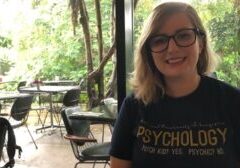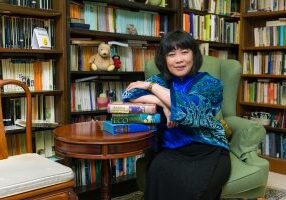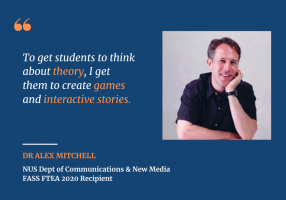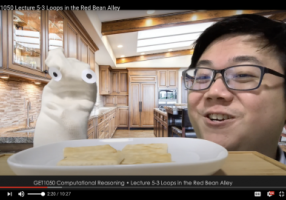Jonathan Sim: Make Students in Charge of Their Learning
November 9, 2020

In homage to children's educational TV series Sesame Street, Mr Sim made sock puppets to explain loops as a concept for GET1050 Computational Reasoning, which moved to virtual learning in Semester 1, Academic Year 2020/2021. (Video screengrab courtesy of Mr Jonathan Sim)
IN BRIEF | 3 min read
- Educators must help students alleviate the fear and anxiety that impede their learning
- Support systems such as a Telegram Helpline help students easily reach out to their instructors and peers, and encourage active learning and peer teaching
- Hands-on learning during physical tutorials aids students to internalise their understanding of abstract concepts
For students to learn well, educators must first help to mitigate the fear and anxiety that impede their learning, said Mr Jonathan Sim, National University of Singapore (NUS) Department of Philosophy instructor, when outlining his teaching philosophy.
He was one of 36 Faculty Teaching Excellence Award (FTEA) recipients, awarded to outstanding Arts and Social Sciences (FASS) faculty in recognition of their high level of commitment in Academic Year 2019/2020.
According to Mr Sim, students often experience anxiety and the fear of failure, especially when they pursue interdisciplinary modules incorporating subject areas outside of their major.
“I encountered many students who failed to internalise their learning because they were afraid of saying or writing the wrong thing,” explained Mr Sim, who has been teaching at NUS since 2017. He began as a part-time Teaching Assistant (TA) for two interdisciplinary modules and is now Module Coordinator and Instructor for GET1050 Computational Reasoning, a mandatory module for all FASS undergraduates since Academic Year 2019/2020.
“There’s this tendency to stick to model answers, to replicate and modify examples. They never really give themselves a chance to try to express what they learnt in their own words,” he added.
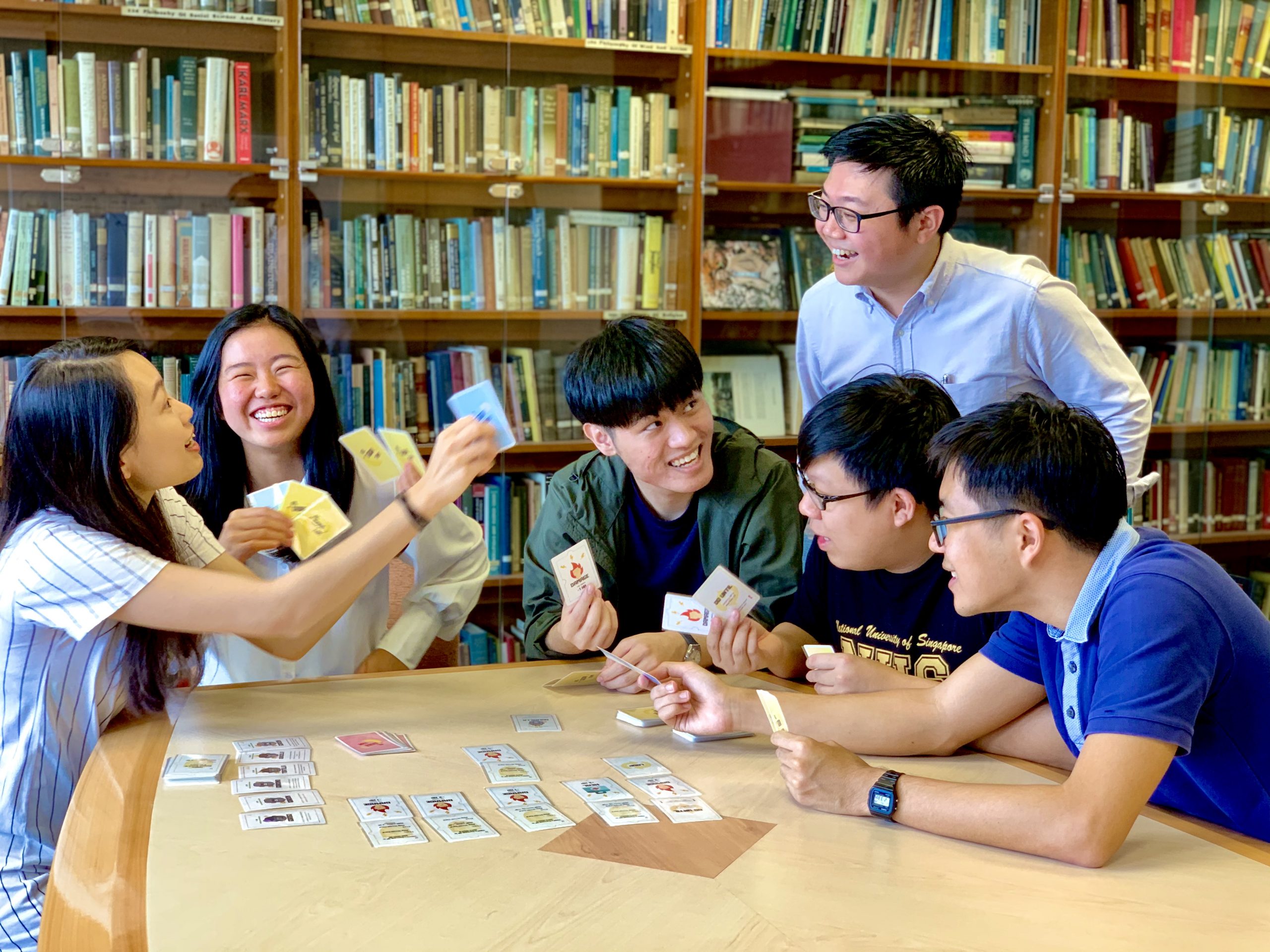
Mr Jonathan Sim looks on as his Teaching Assistants play the ‘Al-GORI-thm Card Game’, which he developed with his undergraduate TAs Talia Vilaire, Daryn Wong and Siti Nur Iman for his module, GET1050 Computational Reasoning. The game helps students learn the basics of conditionals and loops, requiring them to develop algorithms in order to defeat enemy gorillas and win coveted bananas. (Photo courtesy of Mr Jonathan Sim. Note: this photo was taken before Covid-19 safe management measures were put in place)
To help alleviate his students' anxieties and empower them, Mr Sim created a variety of support systems, such as a 'Helpline' chat group on messaging platform, Telegram, for students to reach out to their instructors and peers. He also engages them with humour; and introduces simulated scenarios in a safe environment where they learn to evaluate and recover from failures.
“It is my hope that through these experiences, they realise that failing isn’t as bad as it seems, so they feel more empowered to take risks in their learning, and thus learn more effectively as they discover how to apply what they learnt,” he said.
Mr Sim’s former GET1050 student Audrina Tan, currently a Psychology major and has progressed to becoming one of his TAs, attests to how effective the Telegram Helpline was.
“The Helpline really helped alleviate my anxieties, and made me feel a part of the learning community, seeing that everyone was so willing to ask questions without reservation,” said Audrina, adding that she has learnt numerous learning techniques as Mr Sim’s TA. In turn, she now applies effective scaffolding to help her students learn better.
“Mr Sim places a huge emphasis on the value of active learning and peer teaching. He taught us that as TAs, our role is less to provide answers, but more to facilitate, guide and encourage self-learning,” she explained.
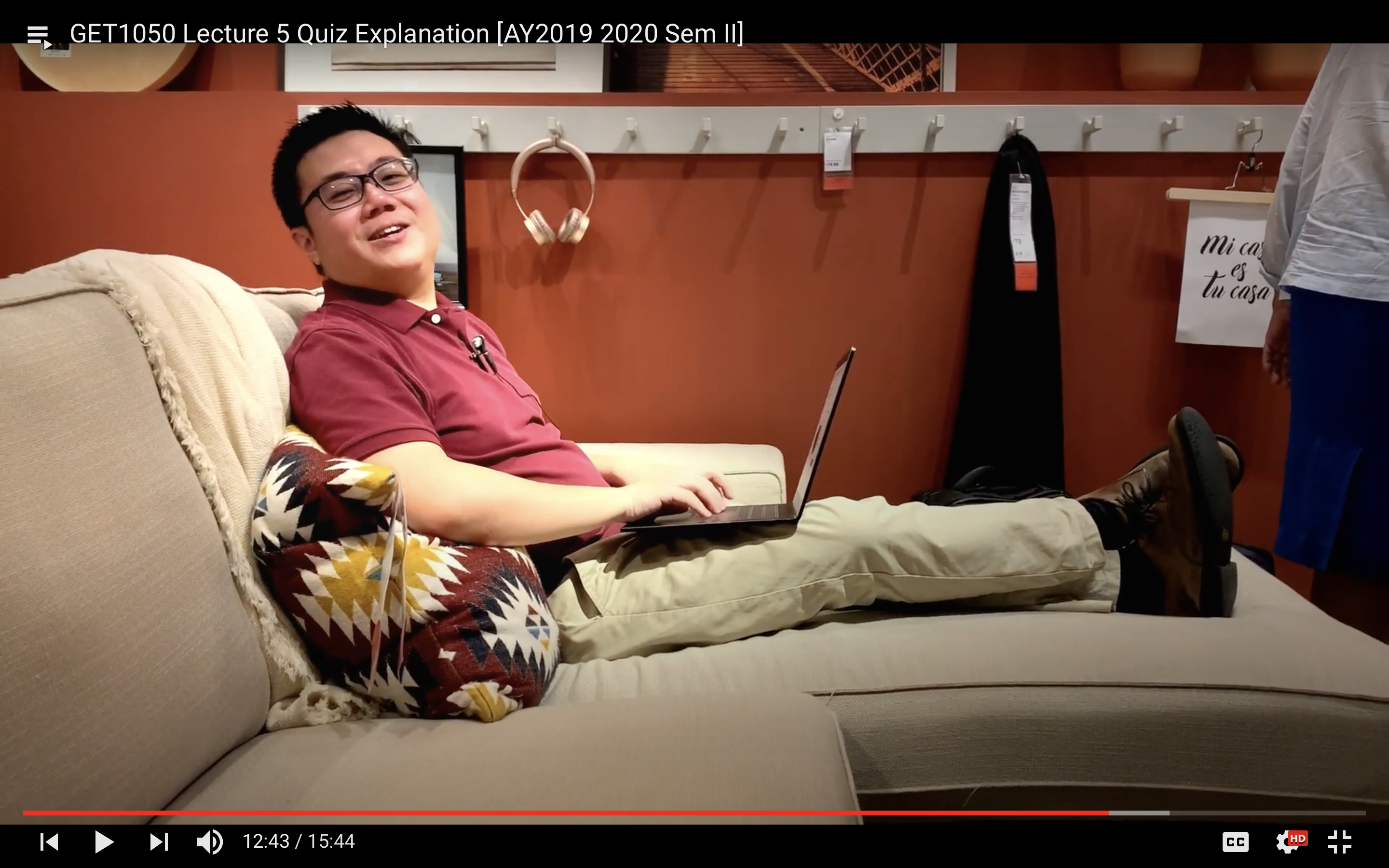
When he had to abruptly move his lessons online during the height of the Covid-19 pandemic in Semester 2, Academic Year 2019/2020, Mr Sim filmed lessons in Ikea to make classes more interesting. (Video screengrab courtesy of Mr Jonathan Sim)
Mr Sim is a strong believer of hands-on learning and quite literally too. For physical tutorials, the teaching team designed games where students used cards and blocks, and moved them around to facilitate internalising abstract concepts, such as algorithms.
Describing his “traumatising experience” of shifting tutorials onto the teleconferencing platform Zoom at the height of last semester’s global health pandemic, Mr Sim related he spent the entire summer break rethinking his approach in preparation for going fully virtual.
There were two major revamps to his lessons, one was modifying the tutorial participation grading rubric to emphasise helping or seeking help from peers rather than a student’s contribution to classroom discussion.
“This was necessary to encourage fast learners to engage in discussion with peers rather than just completing all the learning exercises on their own,” he explained. In the process, fast learners are motivated to apply their learning through peer teaching while struggling students are incentivised to seek help from their group members.
The other change Mr Sim introduced was the creation and use of very detailed and structured Google Docs worksheets for discussion, allowing each group to progress through various learning activities at their own pace. The tutor does not need to wait for every group to be on the same page, but instead attends to groups at their pace and unique learning needs. This way, each group receives a very personalised and intimate learning experience.
“When students are more positive, less focused on grades, and more interested in learning, they bounce that energy off each other,” Mr Sim said. “Once that is set in motion, I don’t have to do very much to keep it going. Students become self-motivated and naturally and actively engage in peer learning despite the constraints of learning online from home.”
This story is the first of three highlighting the pedagogical approaches of selected FASS Faculty Teaching Excellence Award 2020 recipients.
Award Citation
"Mr Jonathan Sim came to his task firmly aware that students’ anxiety can be impediments to their learning, limiting their ability to fully realize their potential. This challenge is especially acute in his case, given that he teaches data analysis and coding to students from the Arts and Social Sciences. The blended-learning format of his high enrolment module introduces other challenges as well, as online learning can be cold and impersonal given the diminished opportunities for social interaction, leading students to think that they are faring worse than their peers, which further affect their confidence and motivation to learn."
—FASS Faculty Teaching Excellence Committee (FTEC) chaired by Vice Dean (External Relations and Student Life) Associate Professor Loy Hui Chieh, and comprising Associate Professor Christopher Michael McMorran (Japanese Studies), Associate Professor Stephen Lim (Psychology), Senior Lecturer Gilbert Yeoh (English Language and Literature), and Senior Lecturer Chen Ingru (Centre for Language Studies).


